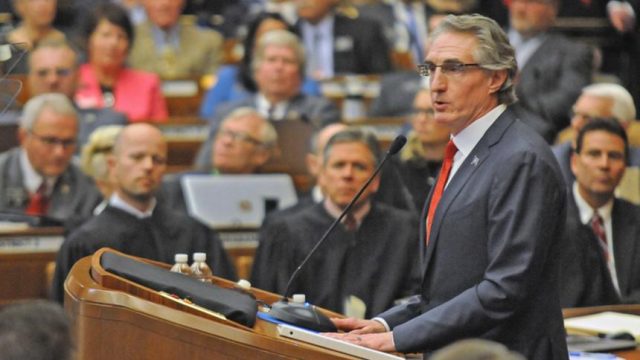Burgum: Legislative session on track to address ND’s biggest challenges

TOM STROMME.Tribune Governor Doug Burgum opened North Dakota's 65th legislative assembly on Tuesday afternoon in front of a joint session of the legislature where he delivered the State of the State address. Gov. Burgum touched on a number of topics in the address but a continuing theme was lifelong education. "Learning begins with humility. Everyone has something to teach us," he said.
Doug Burgum, the 33rd governor of North Dakota, submitted this guest post.
As North Dakota’s legislative session reaches its halfway point with over 700 bills remaining, the opportunity to make a positive difference in the lives of our citizens has never been greater.
Across the state, with help wanted signs in the windows of businesses large and small, our citizens and communities are feeling the effects of North Dakota’s No. 1 barrier to economic growth – the workforce shortage.
Our laser focus on this critical issue was evident with the first bill that legislators sent to my desk to be signed. Providing $68 million in matching funds will help establish 13 career academies across the state where students can pursue high-demand careers in the trades, health care, technology and other sectors.
The second bill signed this session also was workforce-focused, expanding workers’ compensation coverage for full-time firefighters and law enforcement and sending a clear message in North Dakota and beyond that we mean it when we say we “back the blue.”
This only scratches the surface of what we can accomplish this session to attract talent and capital to our state, remove barriers to workforce participation and provide hardworking North Dakotans with real, meaningful tax relief.
When government collects more revenue than it needs to operate, the top priority should be allowing citizens to keep more of their hard-earned money in their pockets. State general fund revenues are running $785 million, or 24%, ahead of forecast for the biennium that ends June 30, 2023, and our overall savings are at record levels.
Thanks to conservative budgeting, overflowing reserves and a strong economy, we’re able to prioritize tax relief with a package that would completely eliminate individual income tax for nearly 60% of those working North Dakotans who currently pay income tax, saving them over $566 million per biennium. For example, a family of five with combined income of $75,000 would save nearly $500 on their state income tax bill.
For those who would still pay income tax, the flat rate of 1.5% proposed in House Bill 1158 would make North Dakota the lowest flat-tax state in the nation, helping us retain existing workers and better compete with other states for new residents – including oil producing states with no personal income tax such as Alaska, Texas and Wyoming.
We also understand the strong desire for the state to help ease the burden of locally driven property taxes. We welcome the opportunity to work with local elected officials to find strategic ways to reduce property taxes, which could mean targeted programs like the proposed expansion of the Homestead Tax Credit.
With more than 30,000 open jobs and the nation’s second-lowest unemployment rate at 2.3%, North Dakota must take a comprehensive approach to solving our workforce shortage, including a stakeholder-led proposal to improve child care availability, affordability and quality.
Workforce, tax relief, infrastructure, education – these are just some of the priority areas we’re working on for the benefit of all North Dakotans, including the tribal nations with whom we share geography.
We’re pleased that our red tape reduction efforts aimed at making government more efficient and responsive to citizens are moving forward, with 52 bills advancing so far.
We continue to advocate for $50 million for destination development to support workforce attraction, communities and tourism growth.
The House has passed funding for a new women’s correctional facility, which will improve outcomes and access to health care for those incarcerated, making for better neighbors once they’re released.
Investments in behavioral health programs will reduce costs downstream and enhance access to much-needed services for mental health, addiction and recovery.
Working with legislators, Agriculture Commissioner Doug Goehring and ag groups to update overly restrictive laws with the Next Generation Animal Agriculture bill will reverse our decades-long decline in poultry, hogs and dairy, provide local markets for consuming processed corn and soybean co-products as feed, add value to farmers’ crops and strengthen rural communities.
And we’re working to accelerate growth of the Legacy Fund and conservatively distribute earnings into four categories: infrastructure, economic diversification and research, community and workforce development, and legacy projects.
Our administration remains focused on these priorities and looks forward to continuing our work with the legislature to ensure that our state, our communities and all of our citizens can reach their fullest potential.




